
One to Ten in Korean How to Count from 1 to 10 in Korean Beeline Korean
Here's how to say one through 10 in Korean: 하나 (Hana) — one 둘 (Dool) — two 셋 (Set) — three 넷 (Net) — four 다섯 (Dasut) — five 여섯 (Yusut) — six
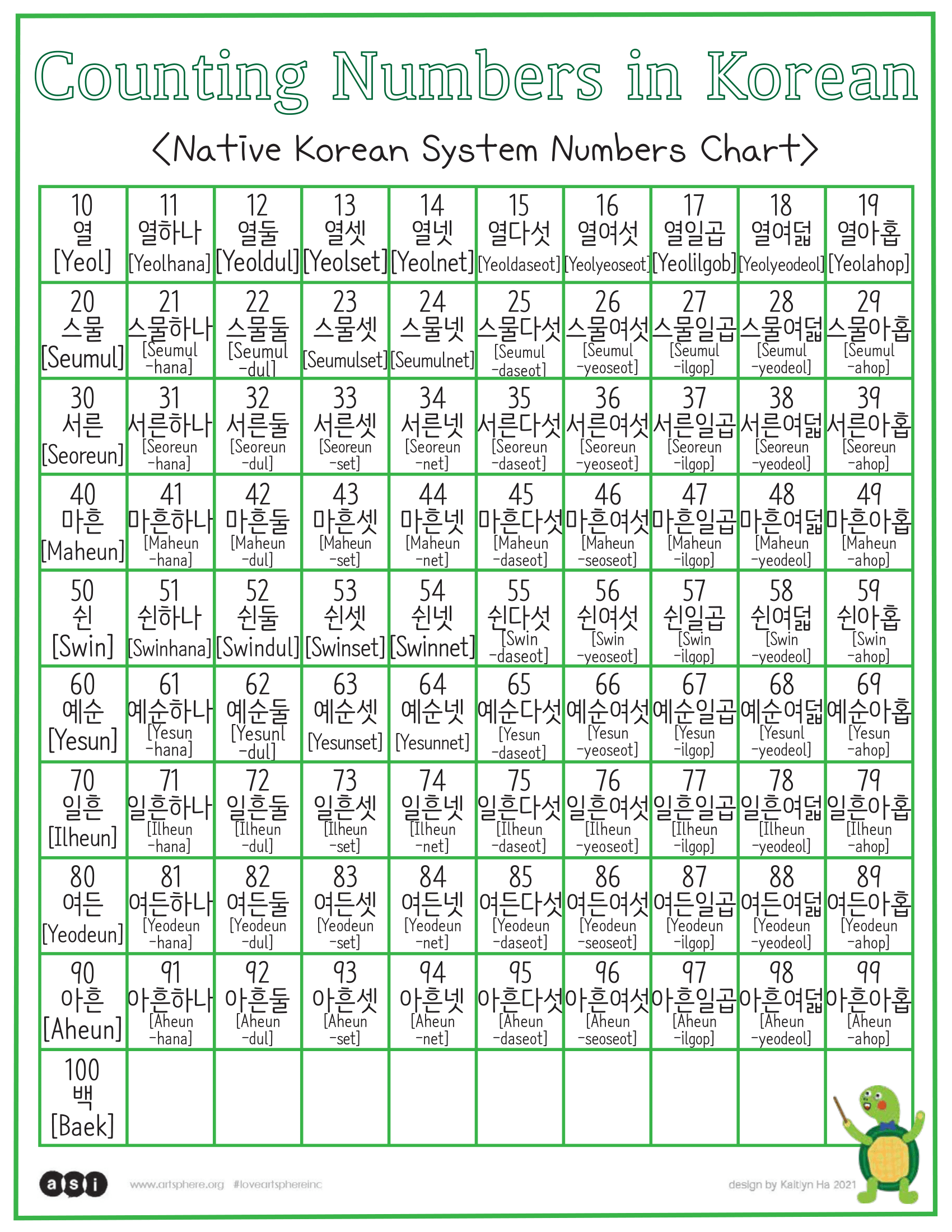
Lesson 8 Native Korean Numbers Chart1 Art Sphere Inc.
How to Count in Korean: Count from 1-4 in Korean. By Beeline Language Korean April 10, 2017 No Comments. Learning how to count in Korean is essential for many conversations and transactions. Take a look at the video to see how we teach you to count in Korean from 1-4. Speak Korean in 10 minutes a day!

Learn Korean Numbers at Lingoh.me koreanLearning koreanLanguage
1. People 2. Animals 3. Inanimate Objects 4. Number of Years in Age 5. Number of Times Something Occurred 6. Text-based Materials 7. Bottles 8. Articles of Clothing 9. Pairs of Socks, Shoes or Gloves 10. Cars and Machines 11. Plates of Food 12. Bowls of Food 13. Beverages 14. Slices or Pieces of Food 15.

How to Count in Korean and Everything About Korean Numbers
1 Complete List of Korean Counters 2 The Korean Number Systems 3 How to Use Korean Counting Words 3.1 Structure for Using Counters with Native Korean Numbers 3.2 Structure for Using Counters with Sino-Korean Numbers 4 Writing Numbers vs. Number Words with Counters 5 Most Common Counters and Numbers 6 List of item counters with native Korean numbers
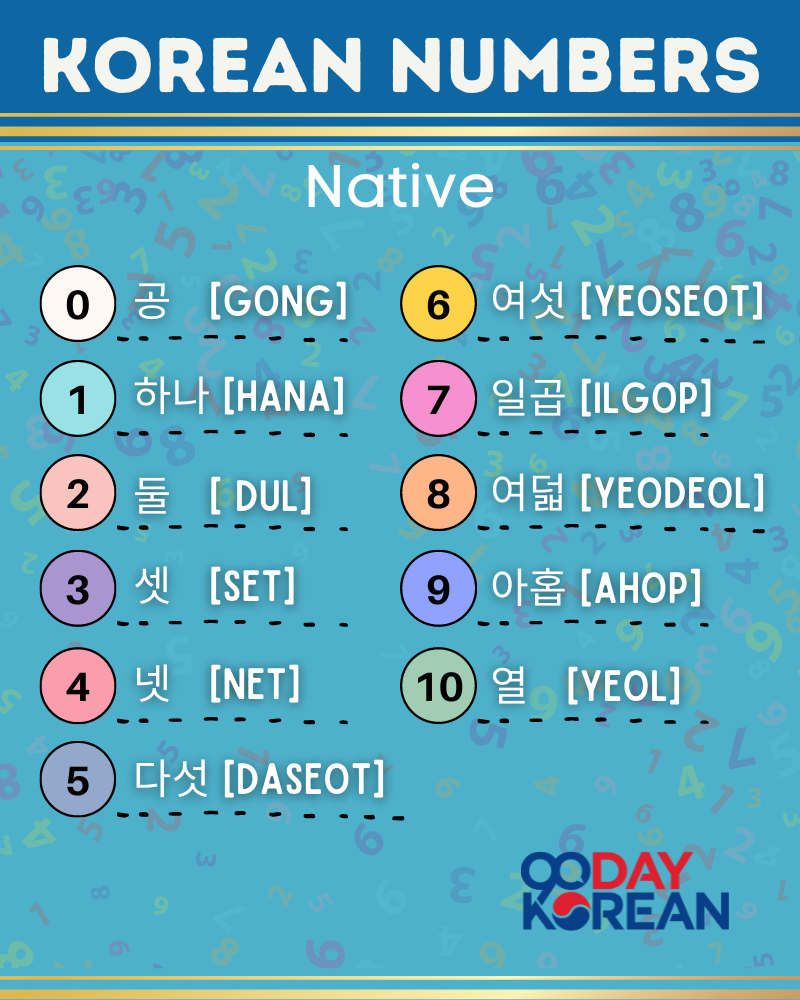
Korean Numbers Step by Step Guide for Counting in Hangul
All about The Native Korean numbers (1~99) & Counters ㅣ How to Count Numbers in Korean - YouTube 0:00 / 9:09 *All About The Sino Korean Numbers.

Learn to Count in Korean Korean words, Korean language learning
Starting from 11 - 99 it is so easy! You just take the first number and the second number that you want to add! So for 11 = 10 (sib) and 1 (il) = 11 (Sib-il). Well for 20 there is a slight tweak there. Let's check: 20 = 2 (i) and 10 (Sib) = 20 (i-sib) and not (Sib-i) which is 12.

How to Count in Korean (Numbers 14) Learn Korean with Beeline! YouTube
Counting in Korean: A Beginner's Guide to Korean Numbers April 13, 2023 TakeLessons Blog > Language > Korean Want to learn to count in Korean? The numbering systems can be confusing for beginners, but this guide and infographic will help you learn to use native and Sino Korean numbers.
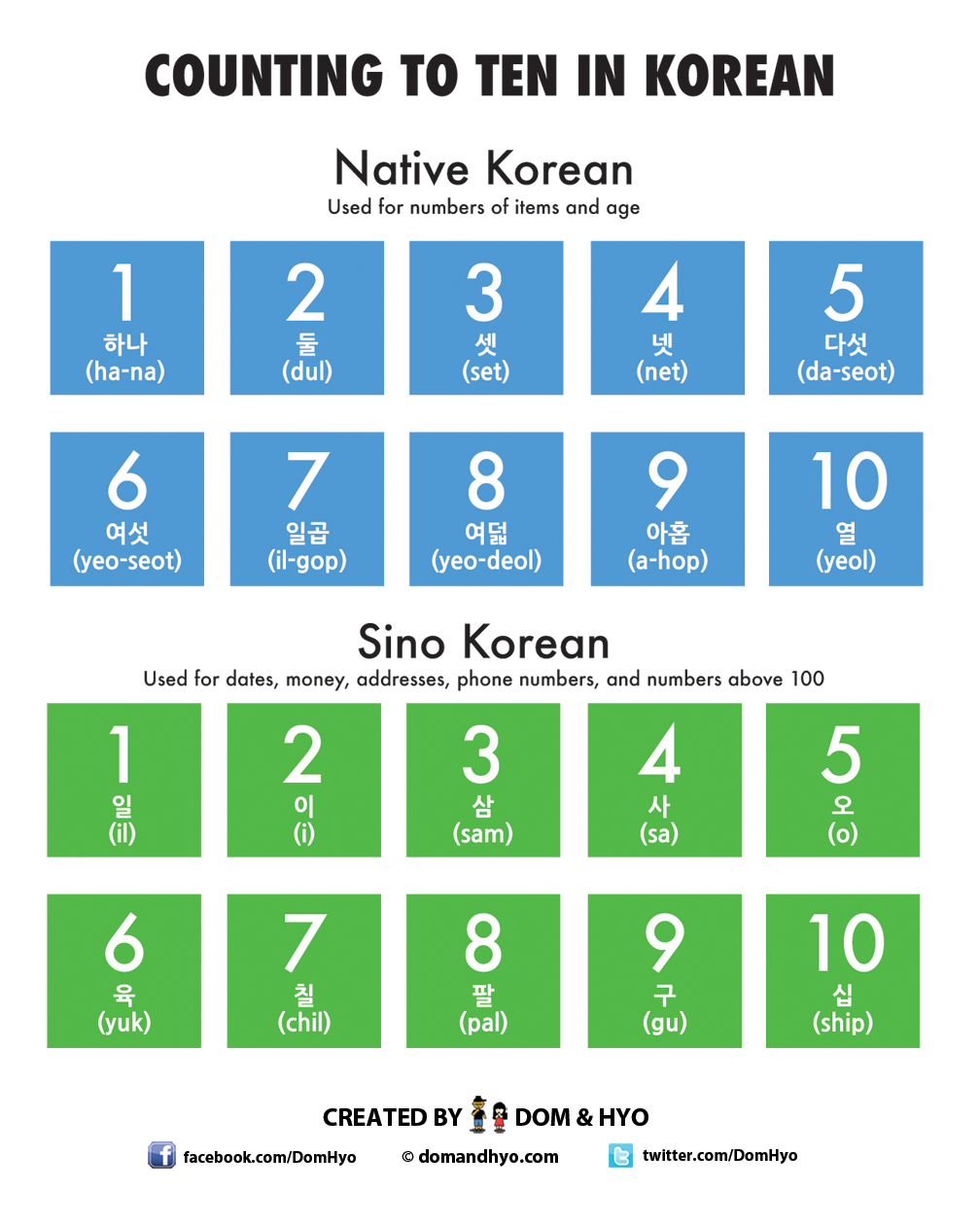
Counting to Ten in Korean Learn Korean with Fun & Colorful Infographics
Table of Contents Why are There Two Counting Systems in Korean? How to Say 0-9 in Sino and Native Korean How to Say 10-100 in Sino and Native Korean How to Say Numbers Up to 1,000 in Sino and Native Korean How to Say Other Big Numbers in Sino and Native Korean How to Give Your Phone Number Shopping - How to Say Prices

How to Count to 10 in Korean 9 Steps (with Pictures) wikiHow
The Right Way To Count Large Numbers In Korean Using SinoKorean Numbers (10,000 and Up). But You'll come across these big numbers while talking about money like discussing your salary, rent, or housing prices. What Are Korean Counters? Korean Counters Structure: How To Use Counters In Korean Language?

How to count 1 to 10 in Korean ️ YouTube
There are four types of bills in Korea. 천원 (cheon-won: 1,000 won is valued at a little less than US$ 1.) It is the smallest bill in Korea. 오천원 ( oh-cheon-won: 5,000 won is valued at a little less than US$ 5.) This is the second smallest bill in Korea. 만원 ( mahn-won: 10,000 won is valued at a little less than US$10.)

How to say numbers and count things in Korean JB's Space
Step1: Find the right counter for nouns. Step2: Fuse with cardinal number/amount after the noun & number Viola. you are done. For example 2 people = Korean word for People +two+ counters for people (i.e. 사람두명 [saramdumyong]= [사람] + [두] + [명]) 5 horses = Korean word for horse + five + counters for animal
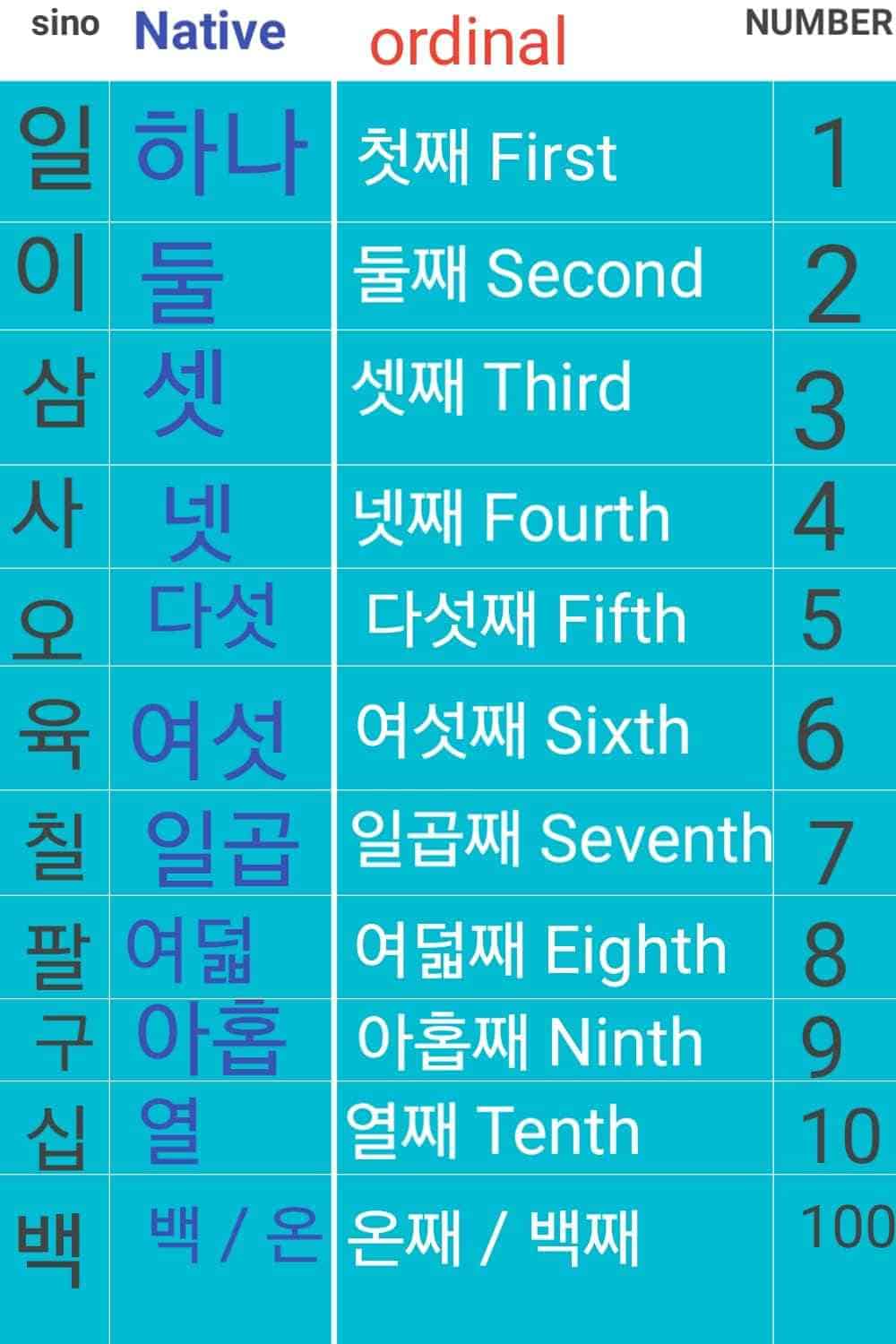
How To Master Korean Numbers? Top 10 Tips Of Korean Number Learn Korean
Want to learn about Korean numbers? You came to the right place, we're going to teach you everything you need to know about how to count in Korean! To start, here is a list of the basic Korean numbers: 0 - 영 (yeong) 1 - 일 (il) 2 - 이 (i) 3 - 삼 (sam) 4 - 사 (sa) 5 - 오 (o) 6 - 육 (yuk) 7 - 칠 (chil) 8 - 팔 (pal) 9 - 구 (gu) 10 - 십 (sip)
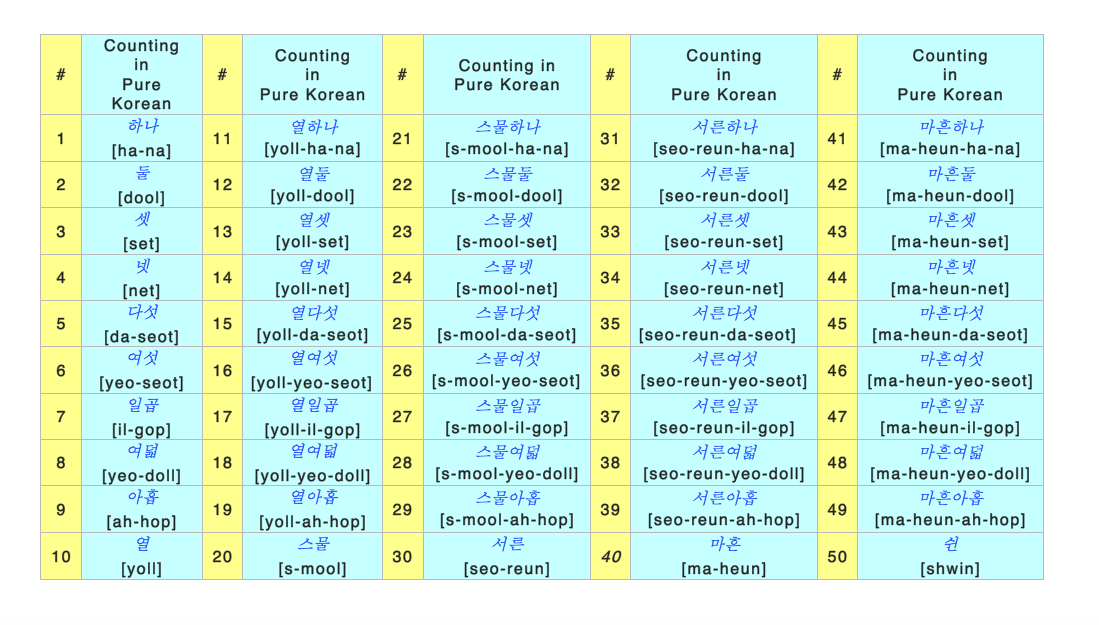
Pure Korean Numbers How to Count 1100 in Korean 1 Korean Language Blog
In this article, we'll teach you how to count from 1-10 using the two systems used in Korea. Let's get to it! Contents [ hide] 1 What are Sino-Korean numbers? 2 Sino-Korean Numbers 1-10 3 What are Native Korean numbers? 4 Native Korean Numbers 1-10 5 Which Korean numbers should I learn first? 6 How to say the Korean numbers 1-10 6.1 1 in Korean

Korean Numbers 110 Free Printable
5 O 오. 6 Yook 육. 7 Chil 칠. 8 Pal 팔. 9 Goo 구. 10 Sib 십. Since it is common to use both ways, it is good to know how to count numbers in both ways. Once you learn how to count numbers from one to ten, it is very easy to learn the higher numbers!

How to Count in Korean and Everything About Korean Numbers
This article will teach you how to count in Korean with both Sino-Korean and native Korea number systems, and everything you need to know about when and how to use Korean numbers in conversations. How to Count 1-10 in Korean Korean Numbers 11-99 Counting 100~999 in Korean Counting 1000~9999 in Korean Counting in Korean vs Counting in English
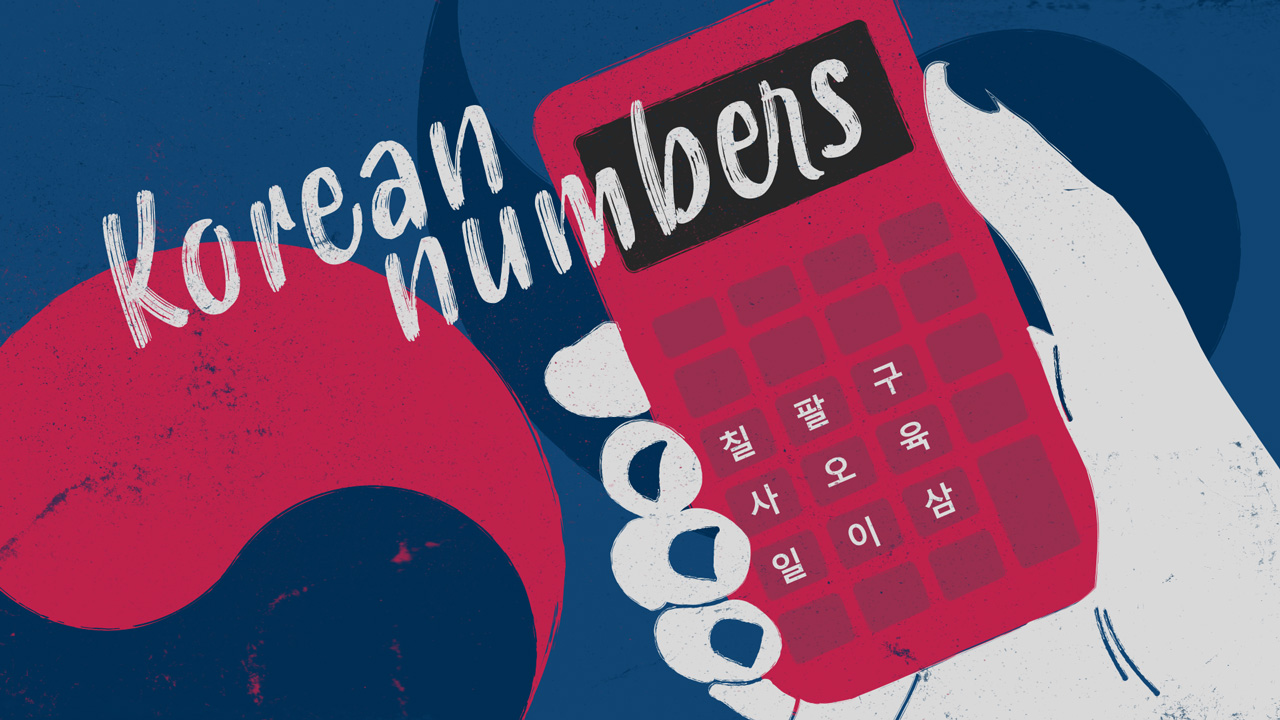
Easy Korean Numbers Counting in Korean from 1 100+
What's the difference? The Sino-Korean System is used for: time (minutes), units of time, the names of months, counting money, saying phone numbers, counting measurements, and etc. The Native Korean System is used for: time (hours), counting objects, counting number of people, age, and for counting in general!